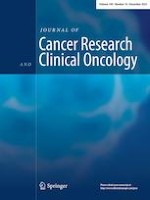Erschienen in:

12.09.2023 | Research
Prognostic and immune correlation analysis of mitochondrial autophagy and aging-related genes in lung adenocarcinoma
verfasst von:
Xiangzhi Meng, Weijian Song, Boxuan Zhou, Mei Liang, Yushun Gao
Erschienen in:
Journal of Cancer Research and Clinical Oncology
|
Ausgabe 18/2023
Einloggen, um Zugang zu erhalten
Abstract
Purpose
Mitophagy and aging (MiAg) are very important pathophysiological mechanisms contributing to tumorigenesis. MiAg-related genes have prognostic value in lung adenocarcinoma (LUAD). However, prognostic, and immune correlation studies of MiAg-related genes in LUAD are lacking.
Methods
MiAg differentially expressed genes (DEGs) in LUAD were obtained from public sequencing datasets. A prognostic model including MiAg DEGs was constructed according to patients divided into low- and high-risk groups. Gene Ontology, gene set enrichment analysis, gene set variation analysis, CIBERSORT immune infiltration analysis, and clinical characteristic correlation analyses were performed for functional annotation and correlation of MiAgs with prognosis in patients with LUAD.
Results
Seven MiAg DEGs of LUAD were identified: CAV1, DSG2, DSP, MYH11, NME1, PAICS, PLOD2, and the expression levels of these genes were significantly correlated (P < 0.05). The RiskScore of the MiAg DEG prognostic model demonstrated high predictive ability of overall survival of patients diagnosed with LUAD. Patients with high and low MiAg phenotypic scores exhibited significant differences in the infiltration levels of eight types of immune cells (P < 0.05). The multi-factor DEG regression model showed higher efficacy in predicting 5-year survival than 3- and 1-year survival of patients with LUAD.
Conclusions
Seven MiAg-related genes were identified to be significantly associated with the prognosis of patients diagnosed with LUAD. Moreover, the identified MiAg DEGs might affect the immunotherapy strategy of patients with LUAD.











